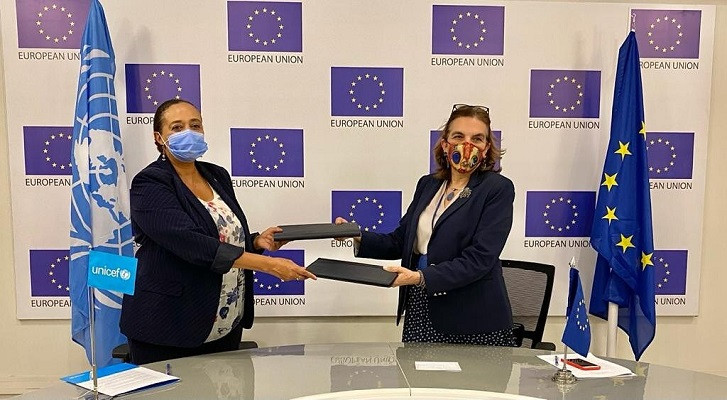
The European Union (EU) and the United Nations Children’s Fund (UNICEF) on Saturday signed an agreement to launch the initiative 'Balochistan Education Support (BES) II', a five-year education development programme, according to a joint press release.
The total cost for this project is estimated to be 22.2 million Euros, from which EU agreed to provide 17.4 million Euros (Rs3.27 billion) and UNICEF will co-finance the remaining 4.8 million Euros (Rs 0.92 billion).
Read: EU hails Pakistan’s progress on GSP-related conventions
The new programme aims to contribute to supporting the Balochistan government to build high-quality performance and management education systems. It will contribute to the overall objective of improving literacy, numeracy, skills and qualifications for the people in the province.
In addition, BES II will help build on all successful reform initiatives of the Balochistan Basic Education Programme (BBEP), such as the new performance management system, the newly established Balochistan Assessment and Examination Commission, strengthened and expanded parent-teacher school management committees, local education councils and the school development process.
Ambassador of the EU to Pakistan Androulla Kaminara said, “The EU is committed to ensuring access to quality education for all boys and girls in Balochistan, which would enable them to follow their dreams and contribute to a better future for Pakistan.”
“The pandemic has had a significant impact on education and our support will focus on addressing some of these challenges,” the envoy maintained.
Read more: UNICEF concerned at children death in landmine blast
While substantial progress was being made under the BBEP, the pandemic adversely affected the gains made in the education sector, as schools remained closed for nearly the entire academic year.
“To make up for the academic time lost due to Covid-19, additional activities have been included in BES II. These include training of teachers on Standard Operative Procedures (SoPs) for school health and safety, tailoring enrolment drives to ensure that children return to education and providing alternatives for children who drop out due to economic impact of the crises,” the joint statement concluded.
1730267052-0/Olivia-Rodrigo-(2)1730267052-0-405x300.webp)

1719745858-0/BeFunky-collage-(1)1719745858-0-165x106.webp)
1731066636-0/khloe-(1)1731066636-0-165x106.webp)

1731062031-0/Express-Tribune--(5)1731062031-0-270x192.webp)
1731065030-0/Untitled-design-(26)1731065030-0-270x192.webp)


1731057827-0/Untitled-design-(25)1731057827-0-270x192.webp)
1731054442-0/BeFunk_§_]-(53)1731054442-0.jpg)










COMMENTS (1)
Comments are moderated and generally will be posted if they are on-topic and not abusive.
For more information, please see our Comments FAQ